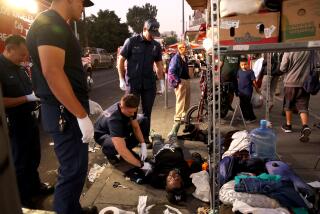Her friend through thick and thin
Her name is Elise Hill. She is in her 40s and has been homeless since 2001. She spends her days in New York City’s Central Park and her nights on the sidewalks.
A onetime heroin addict who worked as a stripper and prostitute, she is also an accomplished painter, sculptor and maker of costume jewelry who was evicted from the home she had known for two decades -- above an elevator shaft in a converted maids’ quarters on the roof of an upscale building in Midtown Manhattan. The rooftop was her artist’s loft.
Her poignant story is captured in a feature-length documentary titled “Begging Naked,” by director and writer Karen Gehres, who spent nine years chronicling Elise’s story, beginning with her friend’s love of painting, to her work in a brothel catering to well-heeled clients, including members of the United Nations, to her gradual descent into paranoia and mental illness.
“It’s been horrible; it’s been horrendous,” Gehres said in a recent phone call from New York, reflecting on the emotional toll a decade of filming Elise has taken on her.
Many times, Gehres said, she wanted to stop. But “I didn’t know how it was going to end,” she explained. “Every time I thought it was over, it wasn’t over.”
When she proposed finding a place for Elise to stay, she was met with resistance.
“She has all these conditions on everything, or paranoia about going anywhere,” Gehres said. “If I had money to put her in a place where she didn’t have to pay rent, I would love to do that. That’s a goal. Just get her out of there.” But Elise would claim “either the mob is after her, or the CIA is after her.”
The documentary will be shown Sunday night at the ArcLight in Hollywood as part of the 11th annual Hollywood Film Festival. The festival opens today and ends with a gala at the Beverly Hilton Hotel on Monday honoring actors Richard Gere, Marion Cotillard, John Travolta, Casey Affleck, Ellen Page, writer Diablo Cody, director Marc Forster and others.
Carlos de Abreu, the festival’s founder and executive director, said “Begging Naked” is part of this year’s festival theme of “giving voice to the voiceless.”
Other films include Teddy Leifer’s “We Are Together,” a look at a 12-year-old and her friends in a South African orphanage who overcome tragedy through singing; Johnson McKelvy’s “Kabul Girls Club,” a film about women in Afghanistan’s capital who form the first women’s soccer league; Sara Bavar’s “Generation Tehran,” which focuses on young people living in Iran; and Aida Schlaepfer’s “Gangs of Baghdad,” shedding light on a little-reported side of life in Iraq’s capital.
Gehres said that every place “Begging” screens, people ask if they can purchase Elise Hill’s arresting artwork.
The director said she has put her friend’s paintings into storage, selling only a few pieces to provide Elise with enough cash to live on. “She doesn’t trust banks,” said Gehres, adding that she is reluctant to sell many more paintings, believing that in time the art world will discover Elise’s talent and the prices could soar, allowing her friend to get off the streets forever.
A freelance field producer, Gehres met Elise in 1989. Both were painters, and Gehres was working in an art supply shop.
“Elise walked into the store where I was working. We just started talking. We just clicked. She was bright and funny and talented. But she decided to go back to stripping, and I was really upset.”
Gehres didn’t start shooting her film until 1996. She was taking video arts classes at the time and had access to a camera. Elise told her, “Come on up and practice on me. I’ll never write my autobiography, but we can at least get it on tape.”
Elise was living a block from Carnegie Hall inside an apartment building. “Basically, she lived on the roof above the elevator shaft,” Gehres said. “It was very long and narrow. It kind of felt like a boat. She carved out these little round windows herself because there were no windows. She lived there 20 years.”
Elise came from an upper-middle-class family in New Jersey. Why she left home is a bit unclear, but Elise talks on film about a fight she had with her dad. “She landed in New York -- literally walked over the George Washington Bridge, walked downtown to Union Square Park, which had the nickname ‘Needle Park’ back then,” Gehres said. “It was filled with pimps and heroin pushers. She was young, just a teenager. She met a guy and got hooked on heroin.”
Gehres said Elise went into rehab and weaned herself off heroin, but she kept working the streets. Her descent into mental illness occurred gradually.
“She said the only time that she was ever medicated for anything was when she was in rehab,” Gehres recalled. “That is when she was 17 or 18 years old. When the paranoia kicked in full force, she stopped paying rent. The guy she was renting that place from -- that little shaft -- had had enough.”
One of the most painful scenes is the day of Elise’s eviction, when she wraps herself with layers of clothing, puts her cat into a carrier and struggles with her belongings on the sidewalk.
Elise can be found most days at Central Park’s boathouse.
Despite Elise’s plight, Gehres is hopeful for her friend’s future. “Knowing Elise, anything could happen.”
More to Read
Only good movies
Get the Indie Focus newsletter, Mark Olsen's weekly guide to the world of cinema.
You may occasionally receive promotional content from the Los Angeles Times.










